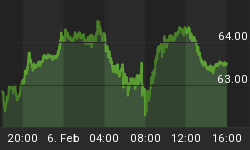Retail sales for the day after Thanksgiving is one of the most over-analyzed statistics spewed forth each Christmas season. That we have such a day to glorify consumers is quite a testament to how important consumers are perceived to be to our economy. Consumer strength has become the bellwether of the strength of our economy, but in accepting this viewpoint, economists have put the cart before the horse. People have long ago forgotten that wealth is created through production, not consumption.
The widespread acceptance of the consumption gauge has also made our government's objective of presenting the illusion of economic activity an easier task. In duping Americans, by way of bubble blowing, into a perception of wealth, our government has kept us consuming, and in fact has spurred us to consume like never before. The stock and housing bubbles of the last decade will, hopefully, be the focus of important Austrian-school texts that will eventually lead us back to real currencies.
A central premise of the Austrian School, that an inflated money supply leads to misallocation of resources, can be a difficult concept to mechanically visualize. The recent housing bubble provides an opportunity for clarity. A house, being a real asset, can gain intrinsic value in only two ways: 1) adding features to the house (which means one's basis rises along with value) or 2) benefiting from improving economic activity in the vicinity of the house. It is the second method which produces real wealth for the owner and also explains why real estate booms and busts tend to be localized. The nationwide boom in housing prices, along with the magnitude of nominal gains, lends strong credence to the case for a bubble.
In the case of housing, misallocation of resources arises from people's perception of wealth from strong home price gains. Home owners perceive the gains as real wealth and do not adjust for inflationary effects. They spend these gains on real goods at a faster rate than their real wealth gains, thereby increasing debt and lowering savings. The effect may not be apparent on a case-by-case basis, but when viewing statistics on a national scale, we see that savings as a percentage of income has gone to zero and that we have a debt bubble that is far more ominous than the asset bubbles we have recently experienced.
The situation is precarious, but the path our government will take is predictable with a high degree of certainty. As a nation of debtors, any deflationary cycle will be unpalatable. Deflation will cause our debts to grow in real terms, causing great distress to us debtors, and therefore our government has fought deflation tooth & nail each time it has been a threat. Those battles have put us in a vicious circle: each deflation-fighting bout has only spurred greater misallocations, which in turn have only made deflation a greater threat. Despite our government's tough talk on inflation, they know behind-the-scenes that deflation is the bigger threat, and the next time we are faced with the prospect, they will print money in volumes that will make the 2001-05 monetary inflation look like a blip.
In a healthy economy... that is one in which production, not consumption, is glorified and in which savings, not debt, is prominent... deflation is a healthy and natural part of the economic cycle. Deflation cleans the less efficient participants out of the economy (they are usually the ones burdened by debt), and increases the value of savings. The combination of these two effects, frees capital to be used for new production, which spurs economic expansion and wealth creation.
The theory is such a simple concept that even politicians can grasp it and would put it to practice if they had an incentive to do so. However, prudent economic practice is not politically expedient because it greatly limits the government's ability to tinker with the economy. Not only is the illusion of economic activity important to a President's desire to fulfill his agenda, but the illusion of sympathy by way of action is important to the Congressman who wants to get re-elected.
Economic tinkering, though counterproductive, is endemic to our system. No political body is going to voluntarily restrict its authority, even to the benefit of the entire system. Therefore, a reversion to a real money system is simply impossible without crisis. But even in crisis politicians have a way of continuing, even exacerbating, the behavior that originally created the crisis (see Murray Rothbard's, "America's Great Depression" for the ideal example).
Despite the hopes and efforts of Austrian-school thinkers, a monetary revolution that hails the return of real money is unlikely without a political revolution opening the path. The political system must be modified to reduce the incentives for tinkering and/or to enforce prudent economic practice.















